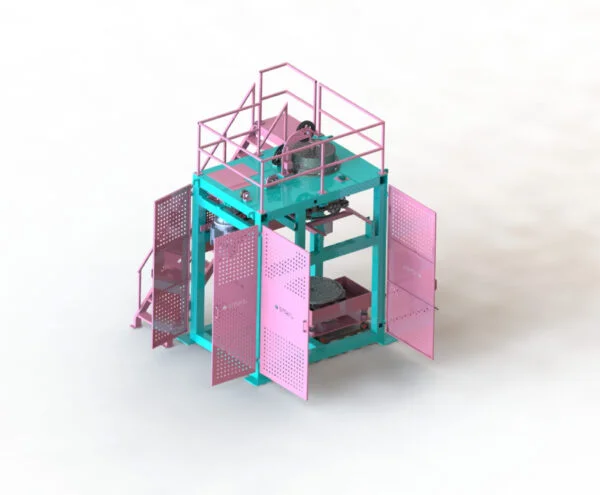In the world of welding and fabrication, efficiency is everything. Downtime spent manually respooling wire, tangles that ruin a perfect bead, and inconsistent feed pressure are more than just annoyances—they are profit killers. This is where a high-quality welding wire drum winding machine becomes an indispensable asset. It automates the transfer of wire from large, economical bulk packs (drums or reels) onto your smaller, shop-floor spools, ensuring a smooth, kink-free feed for your welding equipment.
However, the machine is only as good as the company behind it. Choosing the right welding wire drum winding machine manufacturer is a critical decision that impacts your productivity, ROI, and operational smoothness for years to come.
This guide will walk you through the key factors to consider when selecting a manufacturer to ensure you invest in a solution that truly meets your needs.

Key Considerations When Choosing a Manufacturer
Look beyond the initial price tag. A reliable manufacturer offers value through quality, support, and innovation.
1. Engineering and Build Quality
The core of a great machine is its construction. You need a workhorse, not a prototype.
- Robust Materials: The frame should be constructed from heavy-duty steel to minimize vibration and withstand the high tensions involved in winding. This ensures stability and a long service life.
- Precision Components: Inquire about the quality of key parts like the chuck assembly (which holds the spool), the guide system, and the tensioning mechanism. Premium manufacturers use hardened steel, precision bearings, and reliable pneumatic or electronic systems.
- Durability: A well-built machine is designed for a harsh industrial environment, resistant to dust, metal particulates, and constant use.
2. Technical Capabilities and Customization
No two shops are identical. Your wire types, spool sizes, and production volumes are unique.
- Range of Models: A top-tier manufacturer will offer a range of machines, from semi-automatic benchtop models for smaller operations to fully automatic, high-speed systems with integrated pay-off stands for high-volume production.
- Wire Compatibility: Ensure the manufacturer offers machines that can handle the types of wire you use: solid steel, stainless steel, flux-cored, and aluminum (which requires a different tensioning approach due to its softness).
- Customization Options: Can they modify a standard machine to fit your specific spool size or integrate with your existing material handling systems? The ability to customize is a sign of a responsive and engineering-driven manufacturer.
3. Technology and Control Systems
Modern winding is about precision and repeatability.
- User Interface: Look for machines with intuitive touchscreen PLC controls. This allows operators to easily set parameters like winding speed, tension, and wire length.
- Tension Control: This is arguably the most critical feature. Consistent, adjustable tension prevents wire deformation (especially important for soft and flux-cored wires), ensures tight and even winding, and prevents tangles during welding.
- Automation Features: Features like automatic start/stop, wire end detection, and programmable length counting boost productivity and reduce operator intervention.
4. Safety Features
Industrial equipment must prioritize operator safety.
- Guarding: The machine should have full safety guarding to prevent contact with moving parts like the chuck and traverse guide.
- Emergency Systems: Clearly marked emergency stop buttons and safety interlocks that halt the machine immediately if a guard is opened are non-negotiable.
- Electrical Compliance: The machine should be built to relevant international electrical safety standards (e.g., CE, UL).
5. Reputation and After-Sales Support
The relationship with your manufacturer doesn’t end at the sale.
- Industry Experience: How long have they been in business? A manufacturer with a long track record has likely refined their designs and understands the real-world challenges of their customers.
- References and Reviews: Seek out customer testimonials, case studies, and reviews. A reputable manufacturer will be proud to share success stories.
- Technical Support and Service: What happens if you have a problem? Ensure they offer comprehensive after-sales support, including installation guidance, operator training, troubleshooting, and a clear spare parts supply chain. Responsive technical support is invaluable for minimizing downtime.
6. Value and ROI
While initial cost is a factor, the true measure is Return on Investment.
- Calculating ROI: A reliable machine from a quality manufacturer pays for itself by reducing wire waste (from tangles and misfeeds), saving labor hours previously spent on manual winding, and preventing costly production downtime due to wire feed issues.
- Total Cost of Ownership: Consider energy efficiency, maintenance costs, and the longevity of the machine. A cheaper, poorly made machine will cost more in repairs and replacements over time.
Partner with a Manufacturer, Not Just a Supplier
Investing in a welding wire drum winding machine is a strategic decision to enhance your shop’s efficiency and quality. By choosing a manufacturer that excels in engineering, offers customization, provides robust support, and has a proven reputation, you aren’t just buying a piece of equipment—you’re forming a partnership for a more productive future.
Ready to explore your options? Look for manufacturers who are willing to discuss your specific application, provide detailed specifications, and demonstrate a commitment to being your long-term solution provider.
